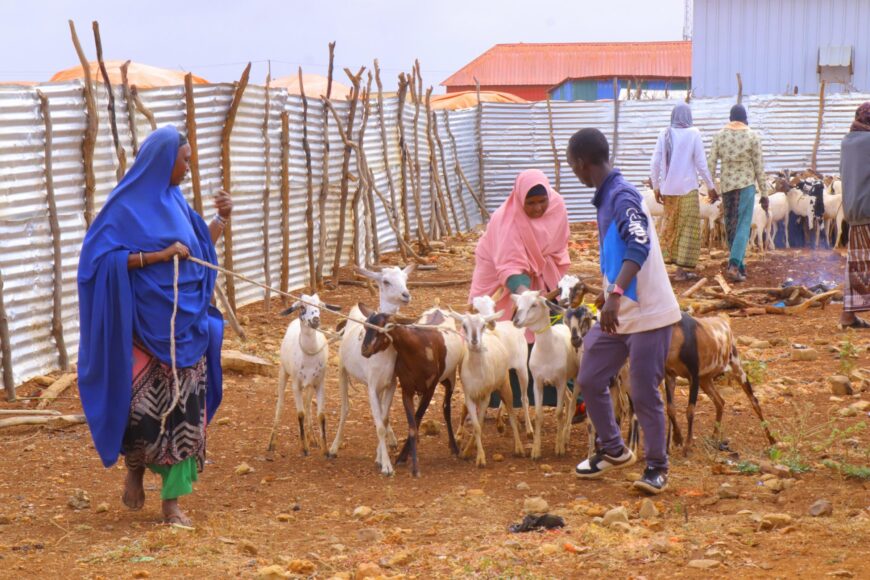Access to food remains a significant challenge for many impoverished families in Somalia. Due to compounding shocks hitting the country, many rural families experience a decline in their livelihoods, leading to disparities in food access and consumption. Social support systems are overstretched, resulting in the migration of people from rural areas to Internally Displaced Persons (IDP) settlements.
The Bay Region has seen a significant influx of new internally displaced persons (IDPs) arriving in various camps. This movement has further strained the needs of the population already living in Baidoa and Burhakaba, two districts affected by a severe drought. The living conditions in these areas have been deteriorating for months, and its population remains highly vulnerable to famine.[1]
Acted is implementing a three-year project called “Building a pathway out of poverty for ultra-poor IDPs and vulnerable host communities” in the Bay region, with funding from USAID through World Vision (WVI). The project aims to increase the purchasing power of 5,000 households, which include ultra-poor IDPs, host communities, and returnees from various IDP settlements, to access food and other fundamental resilience livelihood packaging. The project covers four main sectors, including multi-purpose cash assistance, agriculture, economic recovery, and market systems (ERMS), and disaster risk reduction policy and practice (DRR).
[1] https://reliefweb.int/report/somalia/acted-somalia-boosting-livelihoods-vulnerable-households-through-savings-systems-baidoa
In collaboration with the Somalia Ministry of Livestock Forest and Rangeland Southwest State in Baidoa, Acted conducted a livestock market assessment. The main objective of this assessment was to empower drought-affected communities by enhancing their resilience to drought and other shocks. The assessment helped to understand more about pricing, body condition, pasture and water availability, as well as any livestock health-related issues.
Building resilience among drought-affected communities
Acted has distributed goats to 642 families, with each family receiving 5 goats. This initiative aimed at boosting food security and improving the household nutrition of the beneficiaries. Through this project, vulnerable communities will have their livelihoods restored, which will help them graduate from poverty. Acted and WVI also provided livestock management training to the beneficiaries to help them restore their livelihoods, achieve food security, and promote self-sufficiency for long-term sustainability.

Leyla Ali[1], is a 30-year-old mother of eight children and a beneficiary who lives in Dusta IDP camp. She fled from Misir village in Dinsoor town, which is located some 110 kilometres south of Baidoa city in the Bay region. Leyla used to be a pastoralist before she arrived at the camp due to a persistent drought that struck her village. Since she couldn’t afford to live in major towns that require a stable income to cover expenses, she decided to settle and live in an IDP camp. She first arrived at the camp in 2019 and has been living in hardship ever since, which she had never foreseen.
In late 2021, Acted and WVI, conducted vulnerability assessments in both IDP camps and host communities’ households of Baidoa town to intervene in food security. Dusta IDP camp, where Leyla lived, met the selection criteria and became one of the targeted IDP camps. Leyla was selected and registered for unconditional cash transfer (UCT) for six cycles. Moreover, Leyla benefited from the livestock distribution and received five goats, some of which luckily produced milk. She has been using the milk to supplement her family’s nutritional needs.
[1] The name has been changed to protect the identity of the beneficiary.
Leyla expresses her gratitude towards Acted and its partners for their valuable assistance, which has brought positive changes to her life. Acted is committed to building resilience among communities affected by droughts, so that they can recover and contribute to their communities. Leyla's story is a shining example of Acted's livelihood resilience project making a significant impact.